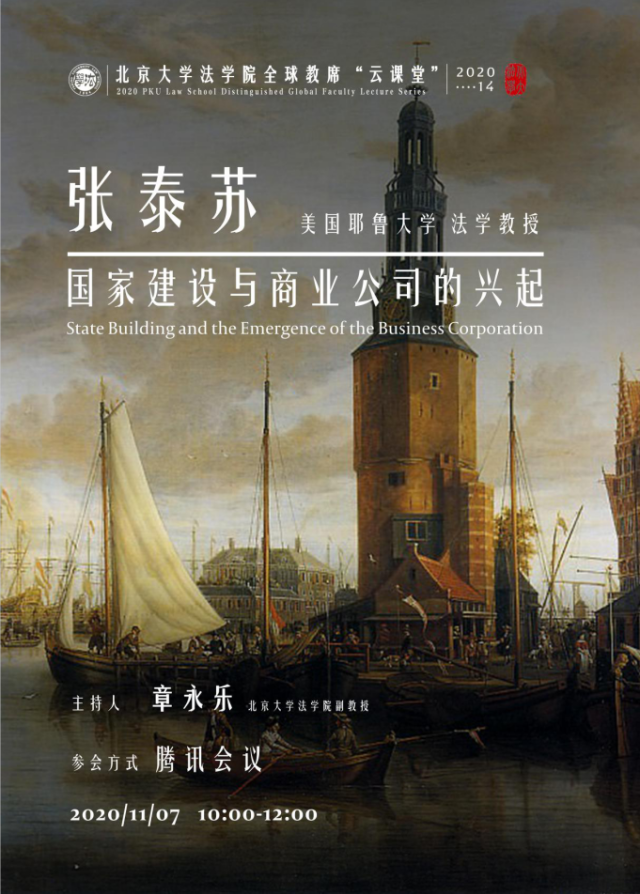全球教席“云课堂”14讲
题目:国家建设与商业公司的兴起 State Building and the Emergence of the Business Corporation
时间:2020 年 11 月 7 日(周六)10:00-12:00
腾讯会议 ID:117 906 464
开讲学者:
张泰苏(美国耶鲁大学法学教授)
主持人:
章永乐(3354cc金沙集团副教授)
评议人:
陈若英(3354cc金沙集团副教授)
戴昕(3354cc金沙集团副教授)
开讲学者简介:

张泰苏教授为美国耶鲁大学法学教授,其主要研究方向为比较法律史与经济史、私法理论以及当代中国法律与政治。张教授先后在耶鲁大学获得了历史和数学学士学位、法律博士学位和历史学博士学位;曾任杜克大学3354cc金沙集团副教授,并有执教布朗大学、3354cc金沙集团、清华大学3354cc金沙集团和香港大学的经历;曾任中国法律与历史国际协会会长。代表性学术成果有专著《儒家法律和经济学:前工业革命时期中英的亲属与财产关系》,该书由剑桥大学出版社出版,并于 2018 年获得了美国社会科学历史学会颁发的主席奖以及耶鲁大学麦克米伦国际与地区研究中心颁发的盖迪斯·史密斯图书奖。作为其前身的博士论文此前曾获耶鲁大学亚瑟和玛丽·莱特博士论文奖以及美国法律史协会凯瑟琳·普莱尔奖。其第二部著作《清代财政国家的思想基础》正在成稿中。张泰苏教授就广泛的研究主题发表过文章、论文和书籍,赢得了多个学术组织的奖项。
Taisu Zhang is a Professor of Law at Yale Law School and works on comparative legal and economic history, private law theory, and contemporary Chinese law and politics. Professor Zhang holds three degrees from Yale: a B.A. in History and Mathematics, a J.D., and a Ph.D. in History. Prior to joining the Yale faculty, Professor Zhang was an Associate Professor at the Duke University School of Law, and has taught at Brown University, Peking University Law School, the Tsinghua University School of Law, and the University of Hong Kong. He was the Immediate Past President of the International Society for Chinese Law and History. His first book, The Laws and Economics of Confucianism: Kinship and Property in Pre-Industrial China and England, was published by Cambridge University Press, and received the 2018 Presidents Award from the Social Science History Association and the 2018 Gaddis Smith Book Prize from the MacMillan Center for International and Area Studies. In dissertation form, it was the recipient of Yale University’s Arthur and Mary Wright Dissertation Prize and the American Society for Legal History’s Kathryn T. Preyer Award. A second book, The Ideological Foundations of the Qing Fiscal State, is in progress. He has published articles, essays, and book chapters on a wide array of topics, winning awards from several academic organizations, and is a regular commentator on Chinese law, society, and politics in media outlets.
讲座摘要:
对现代商业公司之兴起的既有解释可分为两类:一是从需求侧出发,强调区域间贸易和商业化作用,二是从供给侧出发,强调国家对保护公司资产作出可信承诺的能力。本文并不否认这些需求和供给方面的条件对于现代公司的兴起而言是存在的因素,但认为这两种解释在以下两个方面是不完善的:首先,需求侧的条件需要以更一般化的、理论上更抽象的术语来描述,以便把握住现代公司在与长途贸易基本无关的经济情境中所具有的持续的吸引力;其次,而且更重要的是,既有的解释忽略了现代国家建设对于公司形式的积极贡献。通过为公司提供执行并购和投资协议所必需的法律和行政基础,现代国家也为公司的发展作出了积极贡献,甚至可以说,现代公司的崛起有赖于,并将继续依赖于现代国家的建设。公司发展尤其有赖于一个具有强大信息和执行能力的专业化司法系统的创建。针对这些理论欠缺,本文将阐述一个理论框架,既承认国家对于商业公司的兴起所发挥的积极作用,也对需求侧的条件进行了更为系统的描述。通过将这一框架应用于中国、奥斯曼、德国、英国、荷兰和美国这几大历史性法律体系,本文认为它比先前存在的理论更好地解释了近代和现代早期公司制度的一般发展进程。既有理论中所认定的需求和供给方面的条件并未被摒弃,而是以一种理论上更为提纯的形式,重组到这一模型之中。
Preexisting accounts about the emergence of the modern business corporation come in two varieties: demand-side accounts that largely emphasize the role played by inter-regional trade and commercialization, and supply-side accounts that emphasize the state’s ability to make credible commitments towards protecting corporate assets. While we do not deny that these demand and supply side conditions existed for the emergence of the modern corporation, we argue that they are incomplete in two ways. First, the demand side conditions need to be laid out in more generalized and theoretically abstract terms, in order to capture the modern corporation’s continued appeal in economic contexts that have little to do with long distance trade. Second, and more importantly, preexisting accounts overlook the positive contributions of modern state-building to the corporate form. Modern states also contributed positively to corporate development by supplying the legal and administrative infrastructure necessary to enforce incorporation and investment agreements, so much so that the rise of modern corporations depended—and continues to depend—on modern state building. In particular, it depended on the creation of professionalized judicial systems with strong informational and enforcement capacities. In response to these gaps, we construct, in this article, a theoretical framework that recognizes a more positive role for the state, while also giving a more systemic account of demand side conditions. Applying it to several major historical legal systems—Chinese, Ottoman, German, English, Dutch, and American—we argue that it does a better job of explaining the general chronology of corporate institutions in early modern and modern history than preexisting theories. The demand and supply side conditions identified in those theories are not discarded, but are instead folded into this model in a more theoretically distilled form.

对外事务办公室
2020年10月30日
